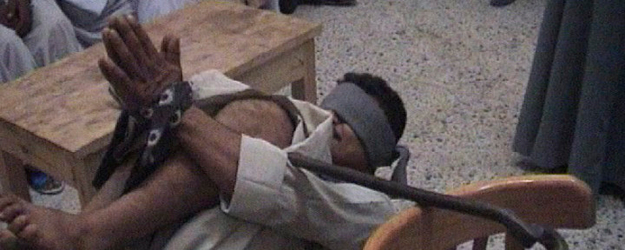- 13 May 2014
- [International Secretariat]
- Region:
- Topic:

Over the last five years, Amnesty International has documented on torture and other forms of ill-treatment in at least 141 countries. © Amnesty International
- Amnesty International has reported on torture or other ill-treatment in 141 countries over the past five years.
- New global survey of more than 21,000 people in 21 countries across every continent reveals fear of torture exists in all these countries.
- Nearly half of respondents fear torture if taken into custody.
- More than 80% want strong laws to protect them from torture.
- More than a third believe torture can be justified.
Amnesty International has accused governments around the world of betraying their commitments to stamp out torture, three decades after the ground-breaking Convention Against Torture was adopted by the UN in 1984.
Governments around the world are two-faced on torture - prohibiting it in law, but facilitating it in practice. Amnesty International has launched latest global campaign to combat widespread torture and other ill-treatment in the modern world.
Torture is not just alive and well – it is flourishing in many parts of the world. As more governments seek to justify torture in the name of national security, the steady progress made in this field over the last thirty years is being eroded.
Since 1984, 155 states have ratified the UN Convention Against Torture, 142 of which are researched by Amnesty International. Amnesty International observed at least 79 of these still torturing in 2014 – more than half the states party to the Convention that the organization reports on. A further 32 UN Member States haven’t adopted the Convention, although the global legal ban on torture binds them too.
The secretive nature of torture means the true number of countries that torture is likely to be higher still. In some of these countries torture is routine and systematic. In others, Amnesty International has only documented isolated and exceptional cases.
The Stop Torture campaign launches with a new media briefing that details a variety of torture techniques – from stress positions and sleep deprivation to electrocution of the genitals – used against criminal suspects, security suspects, dissenting voices, political rivals and others.
Alarmingly, our survey found nearly half (44%) of respondents – from 21 countries across every continent - fear they would be at risk of torture if taken into custody in their country. The vast majority (82%) believe there should be clear laws against torture. However, more than a third (36%) still thought torture could be justified in certain circumstances.
The results from this new global survey are startling, with nearly half of the people we surveyed feeling fearful and personally vulnerable to torture. The vast majority of people believe that there should be clear rules against torture, although more than a third still think that torture could be justified in certain circumstances.
Measures such as the criminalization of torture in national legislation, opening detention centers to independent monitors, and video recording interrogations have all led to a decrease in the use of torture.
Amnesty International is calling on governments to implement protective mechanisms to prevent and punish torture – such as proper medical examinations, prompt access to lawyers, independent checks on places of detention.
The organization’s global work against torture continues, but will focus in particular on five countries, including Mexico and Philippines, where torture is rife.
In Mexico abuse by police and security forces is widespread and goes unpunished. A 31 year-old mother of four was abducted by two soldiers and taken to a military barracks. She was held there for a week, raped three times, asphyxiated and electrocuted to force her to confess that she was involved in drug-related offences.
Justice is out of reach for most torture survivors in the Philippines. A secret detention facility was recently discovered where police officers abused detainees ‘‘for fun'. Police officers reportedly spun a ‘wheel of torture’ to decide how to torture prisoners.
AMNESTY INTERNATIONAL
PRESS RELEASE
13 May 2014




